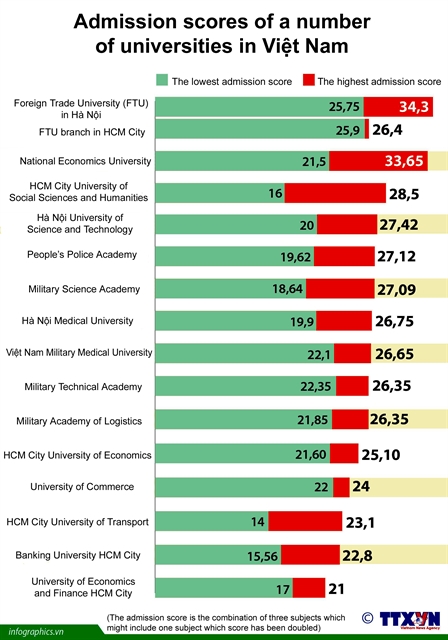HÀ NỘI – As most of universities across the country announce their enrolment results, it is easy to recognise gaps in quality.
That was the message from Nguyễn Thị Kim Phụng, head of Department of Higher Education under the Ministry of Education and Training (MoET) who said there was a big difference between top and low level universities.
Most higher education institutions are looking for students who have hit the 26 point target but some will accept students with just 15 points or lower.
The highest admission score belongs to Oriental Studies Faculty of University of Social Science and Humanities which accepts candidates with 28.5 points or more, an increase of 1.5 points compared with last year.
A lot of faculties at universities in mountains provinces like Thái Nguyên accept candidates with admission scores of between 13-15 points.
Phụng said universities providing training for high quality workforce in line with Industry 4.0, meeting the market’s demand were among those requiring high scores.
For example, the admission scores of Hà Nội University of Science and Technology’s Computer Science hit a record high with 27.42 points, a surge of 2.42 points compared to last year.
Computer engineering, data science and artificial intelligence are the groups with high marks of 26-27 points while nuclear engineering required 20 points - the lowest points of the university.
Statistics from the MoET released in July showed that Business and Management were the two majors which attracted most candidates. Specifically, the number of applications for the majors was up to nearly 823,000 with only 126,470 getting accepted.
Social Security and defence majors also drew many candidates with 739,587 applications, followed by Math, Information and Technology and Science and Technology with more than 640,000.
Phụng said the difference in terms of admission scores reflected their prestige and transparency in enrolment and training.
Candidates tend to choose universities with prestige and good prospects of getting top jobs after graduation.
It emphasised the need to improve the quality of training of universities, she said.
Phụng said it was necessary to classify universities with low admission scores to set forth suitable solutions.
Regarding universities with majors relating to forestry, agriculture and water resources which are considered by many people as not attractive to candidates, she said better conditions should be made available and the quality of training must be improved.
Phụng said the publicity of admission scores was useful for candidates in choosing universities as well as for employers looking for graduates.
Results of the first round revealed that only 49 per cent of universities have met the enrolment targets.
Experts said the admission score of most of the universities this year was between 1-2 points higher than that of the previous year due to the fact that exams were easier so students get higher scores. — VNS
 Society
Society






